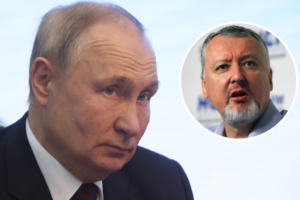
 By David R. Marples on July 24, 2023
By David R. Marples on July 24, 2023
On July 21, Russian authorities arrested Igor Girkin at his Moscow apartment after he criticized and maligned Russian president Vladimir V. Putin in his Telegram page, referring to him as a mediocrity who was destroying Russia because of his weak policies. Girkin had recently founded an informal political group on the far right called the Club of Angry Patriots.
Girkin is a 52-year old former FSB colonel: erudite, ruthless, and an imperialist with a penchant for reenacting scenes of the Russian Civil War dressed in the uniform of the White Army. He is an anti-Semite and fierce critic of democracy, Islam, and the degenerate West.
He has also been involved in numerous wars involving Russia. In the early 1990s, he kept a diary of his exploits in Bosnia, in which he deplored the expansion of Islam.
In the spring of 2014, he was in Crimea with the Russian invasion force, and after its successful annexation he moved to the Donbas, where he became the Minister of Defence and, using the pseudonym Igor Strelkov (sharp shooter), the de facto leader of the so-called Donetsk People’s Republic (DNR), initially led by by Pavel Gubarev.
Girkin made his name as a merciless but incorruptible leader of his troops, who executed subordinates for petty theft and other misdemeanors. His poster was displayed in Donetsk and other cities in heroic poses, and he established his headquarters in Sloviansk further west, as the interim Ukrainian government formed in Kyiv after the Maidan uprising mounted an Anti-Terrorist Operation to remove him and reestablish control.
The relationship between Girkin and the Russian government–particularly Putin–was never fully clear. Girkin had expansionist plans that went well beyond those of the Kremlin, which continued to deny a Russian presence in Ukraine. Aleksandr Zakharchenko, who took over as DNR Prime Minister in August 2014 and remained until he was assassinated on August 21, 2018, referred to Girkin’s military plans as “insane.”
In his phase as military leader, the most atrocious episode occurred on July 17, when Girkin’s troops used a Russian Buk missile to shoot down Malaysian Airlines Flight 17, en route from Amsterdam to Kuala Lumpur. All 298 aboard the plane were killed (283 passengers and 15 crew). An official inquiry in the Netherlands held in mid-November 2022, concluded that Girkin and two others were responsible for the tragedy. Russia has tried to blame Ukraine for the missile that brought down the plane.
Ukraine recaptured Sloviansk in the summer of 2014, but Girkin and a small band of troops escaped to Donetsk, and remained there, shielded by the civilian population. Effectively, his career in the Donbas was over, though he married his second wife, 20-year old Miroslava Reginskaya, in Donetsk in December of the same year.
The pair then moved to Girkin’s native Moscow. Girkin claimed he intended to protect Putin from plots against him. In reality, he was often found reporting from the Donbas in the following months. The maverick Russophile British journalist Graham Phillips interviewed him in Crimea. On another occasion he was photographed on Twitter riding the Moscow metro, just another innocuous passenger in the crowd.
He was most notable for his social media presence, with comments, photographs, and videos on Twitter and on his Telegram site. He attracted an impressive following, mainly because of the frankness with which he criticized the Russian army.
Russia’s wider invasion of Ukraine in February 2022 provided a new sense of mission for Girkin, and represented an affirmation of his earlier ambitious plans. He has been scathing about the civilian Defence Minister Sergei Shoigu and the inept displays of the Russian army in its advances on Kyiv, Kherson, and in the Donbas.
At the same time, his attitude to a fellow critic, head of the Wagner Group Evgenniy Prigozhin, is even more hostile. The clipped intellectual tones of Girkin provide a contrast with the foul-mouthed obscenities uttered in every sentence by Prigozhin. Girkin, also, lives a modest life and is deeply loyal to the Russian state. The rebellion therefore incensed him.
On his Telegram channel, which given the date and time was most likely written by his wife, Girkin asks why such a loyal subject would be arrested when an insurgent with several thousand troops marching on Moscow would be allowed to go free. It is a question that deserves an answer.
One possibility is that Putin and Prigozhin are part of the same mindset: gangsters, business people, who have amassed great wealth and exploited the state to gain excessive power and authority. Girkin, by contrast, is in some ways a simple patriot who lives modestly, albeit one who is an ultra nationalist and Russian chauvinist.
And there is another difference between the two subordinates. Prigozhin never directed his attack on Putin personally. Indeed, he and other Wagner leaders were invited by Putin to the Kremlin after the uprising was abandoned. Girkin, impatient, finally turned his criticism to Putin personally in mid-July:
The country will not survive another 6 years in power of this cowardly mediocrity. The only thing he could do usefully ‘before the end’ … is to ensure the transfer of power to someone truly capable and responsible.
A few days after this was written, Girkin was arrested for “extremism,” a bizarre accusation considering his outrageous acts over the past nine years. He will not be tried until mid-September, by which time the Moscow authorities may find something more convincing with which to condemn him.
His arrest is less a sign that Putin is some sort of political moderate than his need to show some authority amid the chaos of high command and military ineptitude. In this regard, Girkin might be considered a mere pawn but it is unlikely to signal the end of the career of this most notorious of nationalists. For many Russians on the far right, he remains a patriot and a hero, increasingly a rarity.
ABOUT THE AUTHOR:
 DAVID R. MARPLES
DAVID R. MARPLES
Chair of Eastern Europe Studies, CGC; Author “Understanding Ukraine and Belarus: A Memoir”